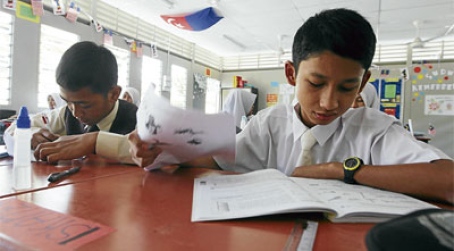Unite in shaping future education
Professor Tan Sri Dato' Dzulkifli Abdul Razak
Learning Curve: Perspective
New Sunday Times - 18-3-2012
THE royal call for Malaysia to enhance unity, made during the opening of the first meeting of the fifth session of the 12th Parliament, must not go unheeded as the country moves forward to strengthen civil liberties and undergo a transformation to safeguard its sovereignty.

The survival of the nation depends on education
There must be a balance between national interests and that of individuals.
The former must take precedence over other matters when it comes to protecting and promoting the unity of the larger community.
"The people must refrain from engaging in any act that will compromise or jeopardise the sovereignty of the country, or try to repudiate the sacrifices of our founding fathers," says the Yang di-Pertuan Agong Tuanku Abdul Halim Mu'adzam Shah. Safeguarding the supremacy of the Federal Constitution is paramount.
In this regard, education is a vital part of the process as it creates responsible citizenry.
As the King emphasised, the younger generation in particular must be able to appreciate the history of the nation's independence and value the freedom that we have enjoyed so far.
Only then can they build upon what the nation has achieved. Malaysia is situated at a strategic geopolitical location that makes it a vulnerable target as the world itself faces an uncertain future.
The theme "unity through education" dates back to the Razak Report of 1956.
The Feb 26 issue of this column reported that the Deputy Prime Minister and Education Minister Tan Sri Muhyiddin Yassin had officiated the recent World Interfaith Week and urged parents and teachers to appreciate Malaysia's diversity.
Schools are the best place to promote understanding. He is spot on.
This is especially relevant when Muhyiddin spoke of a National Dialogue on Education to gather input to transform the education system.
While the focus is on improving access, equity and quality is vital to the transformation, these areas, however, must not be looked at in isolation.
Rather they are a means to an end, which is to fortify unity. Sadly, the issue of unity has taken a back seat as we chase more immediate goals.
In the age of social media and networking, this becomes more apparent when respect for the common good is unwittingly eroded by individual fancies. It is a global phenomenon that is often influenced by political expediency of winning an election at any cost. Such individuals have no qualms about dabbling in political manoeuvring to ensure that their demands are met.
So while we complain that our education system is being politicised, as individuals, we must also accept part of the blame for allowing politicians to behave the way they do.
We must put an end to this, if transformation of the education system is to have any lasting and meaningful impact on a united Malaysia.
The survival of the nation -- and by extension, all of us -- depends on education. A decision today will only manifest itself a decade later and cannot be readily reversed. The future of Malaysia could be in jeopardy if education is used a gambling chip. It is too risky to myopically view education as an election issue every five years.
The chances are we will not be able to run the full trajectory of creating a truly long-term game-change in the education system.
That is why the Razak Report, which aimed to "unify students from all races with one education system that covers all races", is still the cornerstone of the country's education system.
This column has also argued that achieving unity is a 21st century competency that addresses the foundation of the human community which is on the verge of collapsing globally.
This is being increasingly recognised worldwide, even before we can make sense of what the new economy means.
As stated four decades ago in the preamble to the report to the UNESCO International Commission on Education for the 21st Century: "The truth is that all-out economic growth can no longer be viewed as the ideal way of reconciling material progress with equity, respect for the human condition and respect for the natural assets that we have a duty to hand on in good condition to future generations."
So let us take the opportunity during the National Dialogue on Education next month to put unity ahead of other concerns in articulating the agenda for education transformation for the generations to come.
Failure to do so will be our failure to shape our collective destiny as a united sovereign nation.
